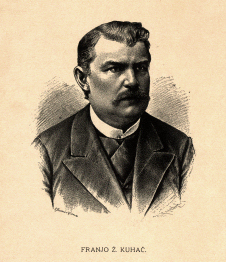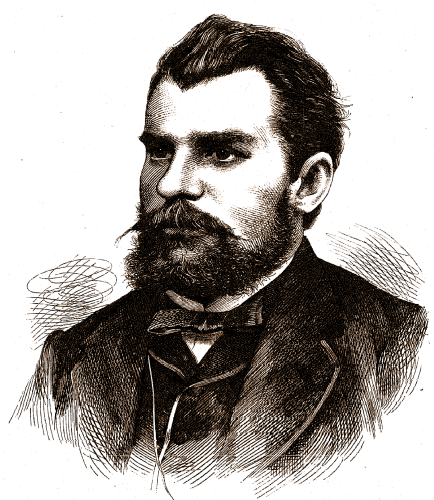Franjo Ksaver Kuhač was one of the most important, interesting and versatile personalities of Croatian musical culture of the second half of the 19th and beginning of 20th century. Ethnomusicology, Comparative Musicology, Music Criticism, Aesthetics of Music, Musical Didactic, Historiography, Lexicography and Composition were just some his fields of interest.
This web site was designed to compliment the Franjo Ksaver Kuhač (1834-1911) project, led by the Croatian branch of IAML (HUMKAD), and funded by Croatian ministry of culture, marking the centennial of his death.
The web site promotes Kuhac's through a biography, a digital archive of his works with sound recordings, a photo gallery, extensive bibliography of Kuhaces works and works written about Kuhac.
|
|
-
 Franz Xaver Koch or Franjo Ksaver Kuhač, as he would later come to be known, was born in Osijek, Croatia into a German family on November 20th, 1834. Acknowledged by many as the founder of the Croatian Musicology - he was, without a doubt, one of the most versatile researchers in his chosen field of study.
Franz Xaver Koch or Franjo Ksaver Kuhač, as he would later come to be known, was born in Osijek, Croatia into a German family on November 20th, 1834. Acknowledged by many as the founder of the Croatian Musicology - he was, without a doubt, one of the most versatile researchers in his chosen field of study.
Finishing his primary and secondary education in his home town he set off to Donji Miholjac, where he began his three year Pedagogy studies in 1848. At the same time he applied himself to serious study of Music. In 1852 he began his two year studies at the Pest-Buda Musical Association Preparatory and Conservatory.
Kuhač spent the years following his studies visiting prominent cultural centers around Europe. He spent time in Weimar and Vienna honing his piano playing skill and mastering various music disciplines.
Through his analyses and research of various forms of traditional music as well as through numerous debates with his teachers on the subject of national versus artistic music, Kuhač became aware of the importance of national music. This awareness was to serve as incitement for further study and development of new artistic forms rooted in traditional music and as such became the basis of all of Kuhačes work.
From 1858 up until 1871 taught private piano lessons, coached students in voice at the secondary school and managed Osijek Singing Society, which performed and promoted works of Slavic Composers. It was at this time that he began systematic research of south Slavic national music. Through his fieldwork he recorded old and new folklore music (about 2500 records), rich word-of-mouth as well as ethnographic and anthropologic corpus. He augmented his fieldwork through thorough search of various archives for manuscripts of long forgotten composers, tireless copying of works of Croatian and Slavic composers and by building an impressive collection of musical instruments and music sources.
-
At the time of his move to Zagreb in 1871 Kuhač was a well-established researcher of Slavic music. Strong sense of national pride led to him changing his German surname - Koch to Croatian – Kuhač. Up until 1876 the taught piano and music theory at the People's National Music Institute (Croatian Music Institute). He quit the position due to difference of opinion caused by his vocal support for reform of the music education on a national level and his strong criticism of Zagreb music scene. He spent the rest of his life working as an independent researcher and music writer.
Having no success in his search for a publisher, he decided to publish his capital work, a collection of “South Slavic National Songs” in a series of tomes. In the period between 1878 and 1881 he published four books containing about 1600 songs. Due to poor sales and rather poor public interest, he decided against publishing further tomes.
In his rather exceptional literary opus there are works that need to be singled out – a study of traditional music instruments published as “Prilog za poviest glazbe južnoslovjenske” the study of dance and instruments used for dance music “Ples i plesovna glazba" , an article on fieldwork methodology “Zadaća melografa", a synthesis of the properties of national music “Osobine narodne glazbe, naročito hrvatske”, treatises on composers, musicians and melographs of the national rebirth “Vatroslav Lisinski i njegovo doba” and “Ilirski glazbenici”, extensive notes and framework for the lexicon of musicians “Biografski i muzikografski slovnik”(manuscript), his works on acoustics “Zur Temperatur “(manuscript), paleography “Kajdopis u Slavena”(manuscript) and music terminology “Katekizam glazbe”(translation of J. Ch. Loebes work).
Although his passion for his work and wish to affirm the values of Croatian and Slavic music might have led him, from time to time to ill-timed or incorrect conclusions, the importance and value of Franjo Ksaver Kuhač's work, especially in light of the fact that he was the pioneer researcher, cannot be denied as they set the foundation for the development of Croatian music science in the 20th century.
The life’s journey of this energetic, persistent and tireless visionary ended on the 18th of June 1911. His bequest and vast correspondence are stored at the National and University Library, Croatian Academy of Arts and Sciences archive and at the Croatian National Archive.
-

 Putnik: Deklamacija uz pratnju glasovira, Spjevao Petar pl. Preradović, Glasbotvorio Franjo Š. Kuhač.**Slavonsko kolo u šest licaj i završetkom sastavio za glasovir, Franjo Šavrio Koch, djelo 22, rukopis*Srdcu: Koncertna popijevka za sitno žensko grlo uz glasovir, Stihovi: Mirko Turić**Kuhačev Katekizam glazbe hrvatski je prijevod glazbeno-teoretskog djela Katechusmus der Musik John. Christ. Lobea.**Vilini glasovi: Tri obljubljene u glasbu stavljene pjesmeza glasovir, priredio Franjo Šaverij Koch**Zagrebačka četvorka, jugoslavjanska izvorna za glasovir, Franjo Š. Koch, djelo 18, izdavač: U Zagrebu, Lavoslava Hartmana : Knjižara i trgovina umjetnah i glasbovinah * *Sachliche Einleitung zu der Sammlung südslawischer Volksliedern von Fr. Š. Kuhač-Koch. Agramer Zeitung (Luna - Zagreb, 1826)**original ustupio: Hrvatski glazbeni zavod (HGZ)**original ustupila: Knjižnica Muzičke akademije u Zagrebu
Putnik: Deklamacija uz pratnju glasovira, Spjevao Petar pl. Preradović, Glasbotvorio Franjo Š. Kuhač.**Slavonsko kolo u šest licaj i završetkom sastavio za glasovir, Franjo Šavrio Koch, djelo 22, rukopis*Srdcu: Koncertna popijevka za sitno žensko grlo uz glasovir, Stihovi: Mirko Turić**Kuhačev Katekizam glazbe hrvatski je prijevod glazbeno-teoretskog djela Katechusmus der Musik John. Christ. Lobea.**Vilini glasovi: Tri obljubljene u glasbu stavljene pjesmeza glasovir, priredio Franjo Šaverij Koch**Zagrebačka četvorka, jugoslavjanska izvorna za glasovir, Franjo Š. Koch, djelo 18, izdavač: U Zagrebu, Lavoslava Hartmana : Knjižara i trgovina umjetnah i glasbovinah * *Sachliche Einleitung zu der Sammlung südslawischer Volksliedern von Fr. Š. Kuhač-Koch. Agramer Zeitung (Luna - Zagreb, 1826)**original ustupio: Hrvatski glazbeni zavod (HGZ)**original ustupila: Knjižnica Muzičke akademije u Zagrebu
|
Papers and works written about Kuhač and his work
|
Published work of Franjo Kuhač - according to the Yugosalv Lexicographic Institute |
List od Kuhaces published compositions |
|
|---|






